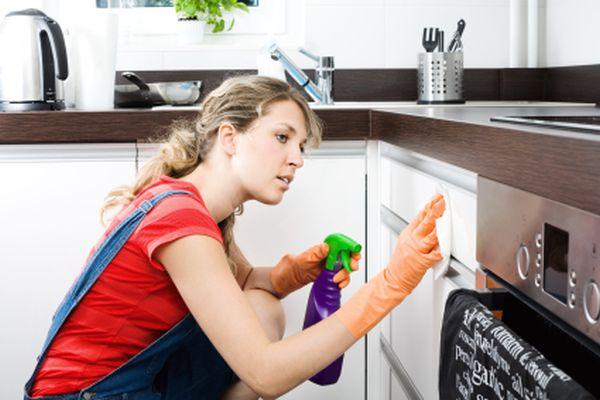Published on 2/15/2022 at 6:00 AM
Paid For ByFor many of us, healthier eating or cooking more at home are on that start-of-the-year resolution list. That means your kitchen is likely going to be the busiest room in the house — aka, where most of the messes will go down. No matter if you’re cooking for just yourself or an entire family, it’s important to keep your kitchen as clean as possible so germs don’t take over.
Honestly, it’s pretty simple — the key is getting into a routine and not letting things pile up. Here are our eight essential tips for keeping your kitchen in tip-top shape this year (ahem, forever):
Clean as you cook instead of leaving a pile in the sink
Instead of leaving all your ingredients out on cutting boards and countertops while you’re cooking, put them away as soon as you’re done with them. Do you only need the butter to get your eggs frying? Pop it back in the fridge while your yolks are setting. Same goes for pans and containers — get in the habit of cleaning them or loading them into the dishwasher while your food is cooking so that you don’t have a daunting pile in the sink at the end of the night. (Because we all know that’s when you’re most likely to leave it until the next morning.)

Invest in a spoon rest
Why create more mess than is necessary? Instead of plopping your dirty stirring spoon, whisk, or other cooking utensil on the countertop, leave a spoon rest out to catch the dribble. You can usually throw these in the dishwasher or hand-wash — which is much more convenient than having to scrub pasta sauce off your counter.
Disinfect, disinfect, disinfect!
This goes for your countertops, trash can, and any other surfaces germs could land on. Instead of using soap, water, and a dirty sponge, keep Clorox® Disinfecting Wipes on hand and at the ready to clean and disinfect at the same time. While you probably don’t need to disinfect your trash can every day, it’s a good idea to make it a habit that every time you cook, do a quick disinfecting wipe down of your countertops and sink to keep germs from spreading. This is especially true if you’ve handled any raw meat or seafood.
Prevent cross contamination
When you use the same dishrag, sponge, or paper towel to clean different surfaces like cutting boards, you run the risk of bringing germs and bacteria picked up on one surface right back over to the other. Make sure you start out with a new rag or paper towel each time so you don’t spread germs rather than get rid of them. You also want to make sure to use separate cutting boards for meat, seafood, and your other ingredients, and always wash your hands, knife, and cutting board with soap and hot water after handling raw meat.
Swap out sponges regularly
Sponges are kind of a terrible invention. Sure, they help scrub grime off your dishes, but then where does the grime go? Usually, it sinks into the crevices of the sponge itself, bringing that bacteria with it to the next surface it “cleans.” If you want to extend the life of your sponge and make sure it doesn’t do more harm than good, make it a practice to boil it for at least 5 minutes every few days.
Scrub your sink and run the garbage disposal daily
The sink can be a bit of a cesspool after all the dishes have been cleaned up. Studies have shown that the sink can accumulate even more bacteria than your garbage bin — and the drain alone can be home to 18,000 bacteria per square inch (!). While steaming hot water and soap will often do the trick, you might want to add some Clorox® Disinfecting Bleach to the mix. Run your garbage disposal and listen as the grime gets eliminated.
Use your dishwasher rather than hand wash
The last thing you want is leftover sauces becoming totally crusted onto plates and sticky drink spillage seeping into the corners of your mugs. To capitalize on your dishwasher’s abilities, scrape off any residue (rather than pre-rinsing) and run your dishwasher when it’s full or almost full. Worried about wasting water and energy? It’s actually more sustainable to run your dishwasher rather than hand wash your dishes. According to the NRDC, you can use up to 27 gallons of water per load by hand versus around three gallons with an Energy-Star-rated dishwasher (and most modern dishwashers, experts say).
Don’t forget about the floors
Finally, don’t neglect your kitchen floors. After all, splatter from hot oil, remnants of an onion skin, and a multitude of other small spills tend to accumulate on the floors. Once or twice a week, give your floors a nice disinfecting clean with a wet mop. Since doing this every night may feel like a stretch, just make it a habit to wipe up any spills on the floor around your cooking station with Clorox® Disinfecting Wipes so that your kitchen is fresh-ish when you make your coffee the next morning.
